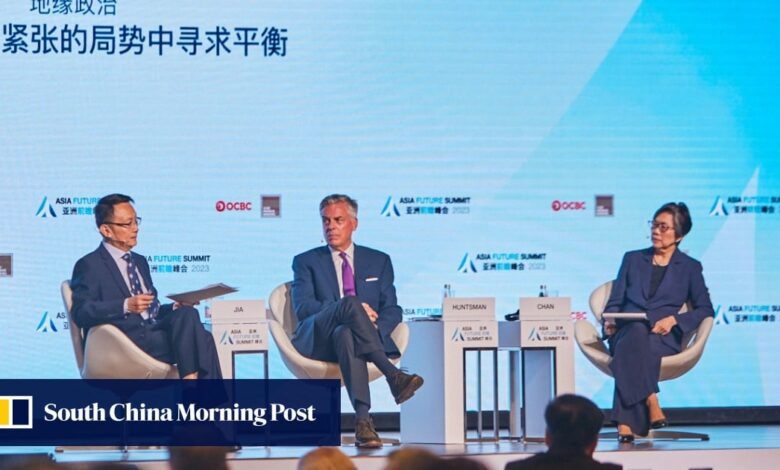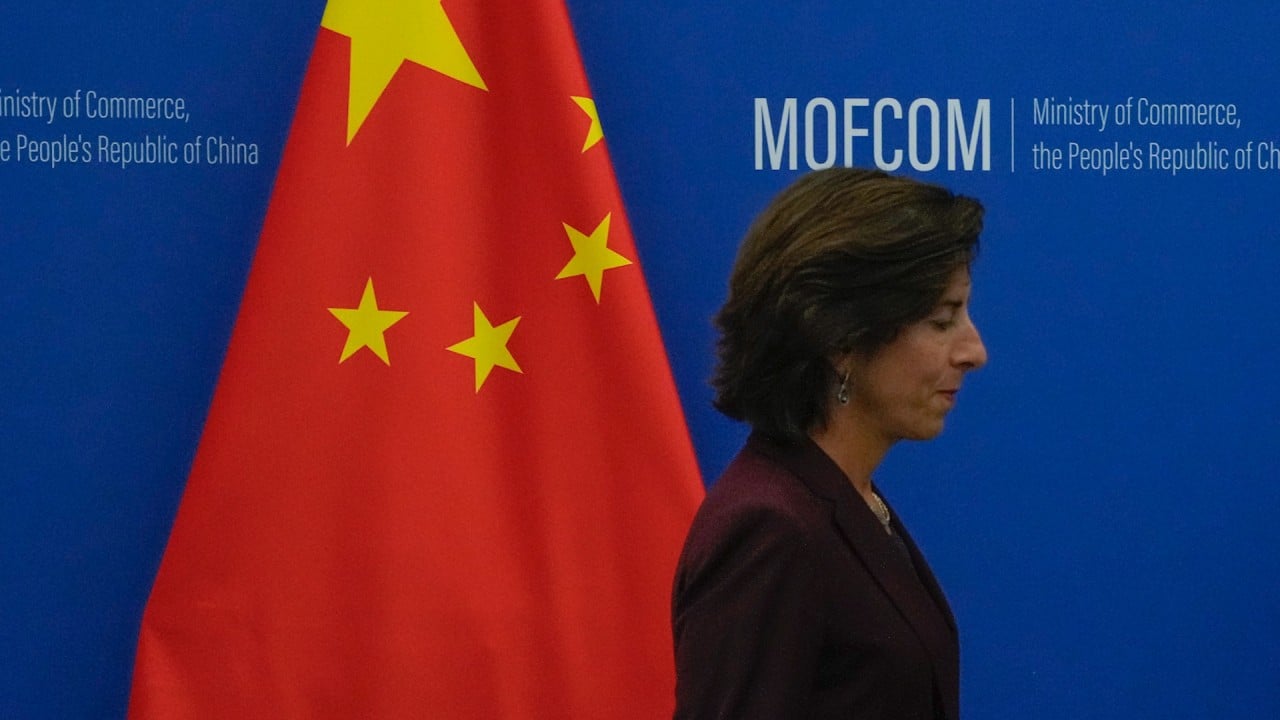Anti-China rhetoric in US campaign could hurt ‘new window of opportunity’ to improve ties: analysts

A rise in anti-China rhetoric ahead of the 2024 US presidential election could affect the “new window of opportunity” for improved ties between the two superpowers, but both Beijing and Washington can take a more “pragmatic approach” to ease tensions and build trust, said analysts at a foreign policy forum in Singapore.
“If history can tell us anything, it’s that whenever you have a presidential election [in the United States], the candidates will compete on getting tough on China,” Jia Qingguo, the former dean of Peking University’s international relations school, said on Wednesday at the Asia Future Summit in Singapore.
The two-day forum, which explores Asia’s role in a fast-changing geopolitical and economic landscape, features heavyweight observers of US-China relations. It is organised by Singapore newspapers The Straits Times, Lianhe Zaobao and The Business Times.
Jia was speaking alongside two others – Singapore’s ambassador-at-large Chan Heng Chee and veteran US diplomat Jon Huntsman – at a panel where they tackled questions about US-China tensions, deteriorating military relations and the factors hampering stable ties.
A brief “window of opportunity” had opened up as Beijing stepped up efforts to revitalise its economy, said Jia, who is also a delegate to the Chinese People’s Political Consultative Conference – Beijing’s top political advisory body.
“To do that, you need to do things both at home and overseas,” he said, noting that this could “help us understand” why there had been more meetings and engagements between Chinese and US officials in recent months.
This was unlikely to last, however, given that the relationship remained fragile as seen from events such as the “spy balloon saga” that reignited tensions, he added.
How ‘big winner’ Vietnam walks the US-China rivalry diplomatic tightrope
How ‘big winner’ Vietnam walks the US-China rivalry diplomatic tightrope
Huntsman, a former US ambassador to Singapore, China and Russia, suggested that harsh anti-China rhetoric from US presidential candidates should not be taken too seriously, adding that the same kind of rhetoric against Washington was not uncommon among Beijing lawmakers as well.
He called on politicians to “start small” by seeking to understand current political constraints, and then look for opportunities during a lull in tensions to hold discussions.
However, Huntsman conceded that the US could do more to better understand “the political constraints and realities” of its counterparts, explaining that many Americans continued to live in a bubble and were “less curious” about developments playing out in major countries.
“We’ve reached a point where in order to maintain global stability … we owe it to each other to better understand the political constraints inherent in the system and try to work around those,” he said.
Singapore’s Chan posed a question on how Beijing would respond to anti-China rhetoric from US politicians and whether it would be “taken with a pinch of salt”.
Jia said this was not the case and policymakers would take these comments “seriously”. Comments made on the campaign trail were done for “political purposes” and held “symbolic” significance, Jia noted, adding that such remarks would anger Chinese citizens and prompt the Chinese government to take a “tough position” on the US.
To overcome this challenge, Jia suggested a “more pragmatic approach to dealing with each other” and working towards tackling concrete issues, building on shared interests and cultivating trust in the process.
Both countries could also seek to “alleviate some of the prejudice” they might have about each other, he added.
Little hope of Chinese president meeting US senators in Beijing, analysts say
Little hope of Chinese president meeting US senators in Beijing, analysts say
On improving military dialogue, which had deteriorated following a visit to Taiwan by former house speaker Nancy Pelosi, Jia said the US should start by lifting its sanctions on China and reducing its military operations in the contested South China Sea and the Taiwan Strait.
While avoiding conflict should be the “first order of business”, Huntsman also stressed the importance of improving how the Chinese and Americans viewed each other. He described it as a “structural problem” and not something that could be easily solved in a “negotiating table by coming up with a temporary compromise”.
“It’s going to be a long-term effort, but it has to be rebuilt,” he said, highlighting possible areas for discussion such as strategic stability and proliferation, which could offer some “transparency” as China ramped up its strategic forces.
“As difficult as that might be, I think it would be a very important signal to both sides that we are looking at what could be the most catastrophic element of a sour relationship and we are doing something about it, even some very elementary steps,” he said.
US should play China ‘long game’: Singapore’s Tharman Shanmugaratnam
US should play China ‘long game’: Singapore’s Tharman Shanmugaratnam
There have been expectations in recent weeks that a flurry of high-level diplomacy will be capped by Chinese President Xi Jinping attending the Apec summit in California later this year, where he could also hold talks with his US counterpart Joe Biden.
The Biden administration has dispatched cabinet-level officials to Beijing since June. Daniel Kritenbrink, the top State Department official for Asia, held talks with China’s Vice-Foreign Minister for Asia Sun Weidong last week.
US national security adviser Jake Sullivan and Chinese Foreign Minister Wang Yi met in September in Malta to discuss a possible Xi-Biden meeting.






